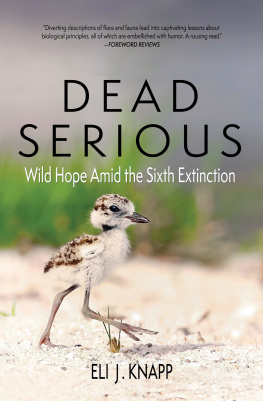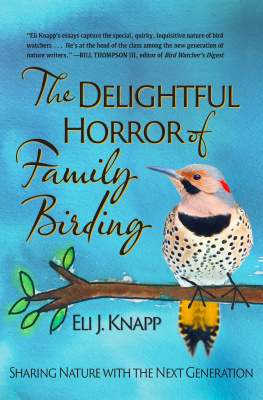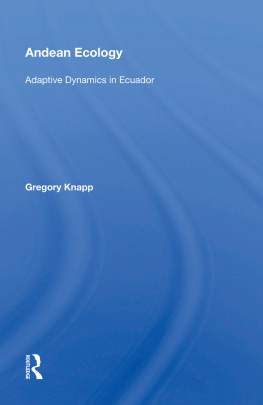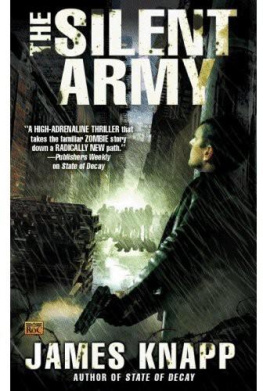Table of Contents
Page List
Guide
PRAISE FOR
DEAD SERIOUS
Clever prose and gifted storytelling enliven Eli J. Knapps Dead Seriousdiverting descriptions of flora and fauna lead into captivating lessons about biological principles, all of which are embellished with humor. A rousing read.
FOREWORD REVIEWS
For Emily Dickinson, Hope is the thing with feathers. True in so many ways, but in Dead Serious, Eli J. Knapp reminds us that in the face of the ongoing sixth extinction, hope also is the thing with fur, fins, or scalesand at times, even a thing with an upright, bipedal posture and opposable thumbs. Through a mix of personal story and descriptive vignettes of conservation science, Knapp leads us on a fascinating and entertaining journey through the many causes of extinctionand toward the hope that we need to do the hard and at times discouraging work of saving the world we love.
CHRISTOPHER NORMENT, author of Relicts of a Beautiful Sea: Survival, Extinction, and Conservation in a Desert World
A humorous take on extinction? Although the theme of this book is extinction, and although Eli J. Knapps charming stories often crack me up, this book is, indeed, dead seriousexcept where it is heartfelt and funny. Knapp makes extinction relatable to those of us who feel far removed from ivory-billed woodpeckers and tiny arctic flowers growing on high peaks of the Adirondacks. Im not surprised that always-insightful Knapp has come up with an original take on such a dire and disturbing topic. Heavy-handed, hard-science writings on what is happening to the biosphere are challenging to read and leave one feeling hopeless. This book is the opposite of that: personal, engaging, even hopefulwhat a great way to confront such an important, weighty subject.
DAWN HEWITT, editor of Bird Watchers Digest
A book about our wild lives teetering on the edge of extinction titled Dead Serious that is also dead smart and dead funny could only be written by Eli J. Knapp. Knapp offers himself as companion and guide to lead us toward a hope as wild and inspired as his imagination.
SUSAN FOX ROGERS, author of My Reach: A Hudson River Memoir
In Dead Serious, Eli J. Knapp outlines the evolutionary ecology regarding extinction of speciesa very serious issue for our time. However, this is not a depressing read, but a highly engaging one, with many intriguing encounters with wildlife.
TOM WESSELS, author of Reading the Forested Landscape: A Natural History of New England
DEAD SERIOUS
DEAD SERIOUS
Wild Hope Amid the Sixth Extinction
ELI J. KNAPP
TORREY HOUSE PRESS
Salt Lake City Torrey
First Torrey House Press Edition, September 2021
Copyright 2021 by Eli J. Knapp
All rights reserved. No part of this book may be reproduced or retransmitted in any form or by any means without the written consent of the publisher.
Published by Torrey House Press
Salt Lake City, Utah
www.torreyhouse.org
International Standard Book Number: 978-1-948814-40-9
E-book ISBN: 978-1-948814-41-6
Library of Congress Control Number: 2020946735
Cover photo by Dennis Goodman
Cover design by Kathleen Metcalf
Interior design by Rachel Buck-Cockayne
Chapter illustrations by Linda M. Knapp
Distributed to the trade by Consortium Book Sales and Distribution
Torrey House Press offices in Salt Lake City sit on the homelands of Ute, Goshute, Shoshone, and Paiute nations. Offices in Torrey are on homelands of Southern Paiute, Ute, and Navajo nations.
Expert birder Kimberly Kaufman has said that everyone is a birder somewhere deep down inside.
Everybody, that is, except my mother.
Even so, I dedicate this book to Mom and Dad, for the love and ceaseless support youve shown me. I recognize that my life has been for the birds. But what a joy it has been to share it with you.
TABLE OF CONTENTS
Rarity (Low Density)
Rarity (Small, Infrequent Patches)
Limited Dispersal Ability
Inbreeding
Loss of Heterozygosity
Founder Effects
Hybridization
Successional Loss of Habitat
Environmental Variation
Long-Term Environmental Trends
Catastrophe
Extinction or Reduction of Mutualist Populations
Competition
Predation
Disease
Hunting and Collecting
Habitat Disturbance
Habitat Destruction
INTRODUCTION
Be who you are and say what you feel, because those who mind dont matter, and those who matter dont mind.
Bernard M. Baruch
R emove your trousers.
I hesitated. Already shirtless, I shot Wilberforce a severe look. Siafu, he said, stoically returning my gaze. But there was a glint in his eye. Adjusting his turban, he sat down on a log and leaned back. As a longtime birding guide, this was par for the course, a chance to watch his guests perform brief, spasmodic ballet. I had known this placid Kenyan man for less than a day, but this was no time for modesty. I was antsyliterally. Dozens of African pinching ants had crawled up my pantlegs and let their vicelike mandibles loose on my nether regions. No mere brush-off ants, these were pit bulls, locked on and hellbent.
There was no way to remove the ants modestly. Down came my drawers. I grabbed and flung, twirling and twisting with each new pinch. In the midst of my frenzy, Wilberforce raised his binoculars in my direction. Dusky tit, he said, his binoculars trained on a thicket just to my right. I stole a glance at my chest. Good, at least he wasnt referring to me. Although relaxed, Wilberforce had a palpable focus: he would show me, ant-covered or not, as many of Kakamega Forests glorious birds as possible.
Hours ago, just minutes into our daylong hike, an African blue fly-catcher had appeared in a shadowy tangle well below the sun-drenched canopy. See? Wilberforce asked, preferring one-word questions. I shook my head. I saw nothing. Undeterred, he removed a yellow plastic comb tucked into his turban. Id seen these mass-produced, Chinese-made combs on every street corner in Nairobi; theyd caught my eye because theyd caught the sun due to the small mirror glued to the handle. Id never considered dropping thirty cents on one, mostly because I had little hair left to comb. Also, because Id never dreamed how useful they could be in a gloomy forest. With one step to his left, Wilberforce caught a stray sunbeam and redirected it upward with the mirrored comb. There, with a spotlight all its own, was the African blue flycatcher. Awash in ephemeral fame, it flicked its powder-blue tail and tilted back its bill. I half expected it to belt out Kenyas national anthem. Instead came a few high-pitched tseedle-tseedle notes.
A chintzy comb. And I had thought laser pointers were needed for this.
Thirty minutes later, Wilberforce stopped mid-stride on a gravel road bisecting the forest block. A motorcycle approached, its engine whining like an oversized mosquito. Around the bend it came, unde-viating from a path straight toward us. I leapt into the ditch. Not Wilberforce. He stood his ground, the motorcycle missing him by inches. I stared at him, starstruck. Who was this man that even the wind and waves and motorcycles obey him? Wilberforce stared at a pothole in front of him. His index finger went up. Hear? he asked.

















